|
74 Herne Bay Road
Swalecliffe
01227 792310
https://whatpub.com/wheatsheaf
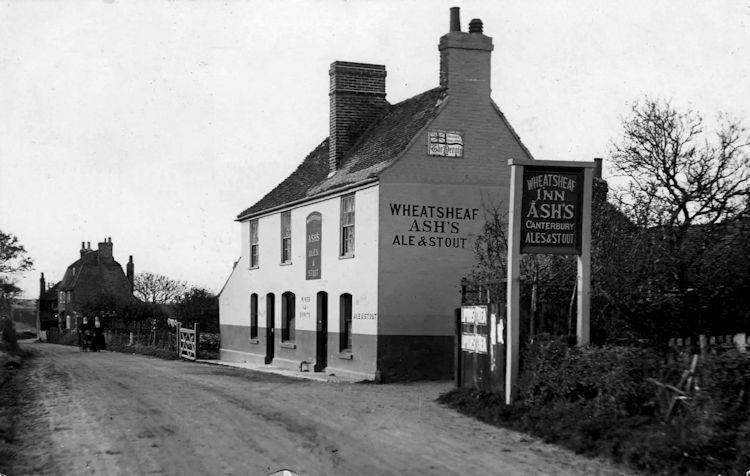
Above photo circa 1910. Kindly sent by Rory Kehoe. With the
Wheatsheaf proudly proclaiming itself an outpost for Ash's Ales and
Stout, brewed at the Dane John Brewery, Canterbury. In 1920 Ash's raised
£255k via an IPO in order to merge with the East Kent Brewery, Sandwich.
Ash's IPO prospectus was very optimistic about future market conditions
and prospective dividend payments. However, the reality was, that
returns on investment were poor and the new company, Ash's East Kent
Brewery, soon found itself overstretched and facing financial
difficulty. In 1923 AEKB accepted an offer from, and was acquired by,
Jude, Hanbury's Kent Brewery, Wateringbury. |
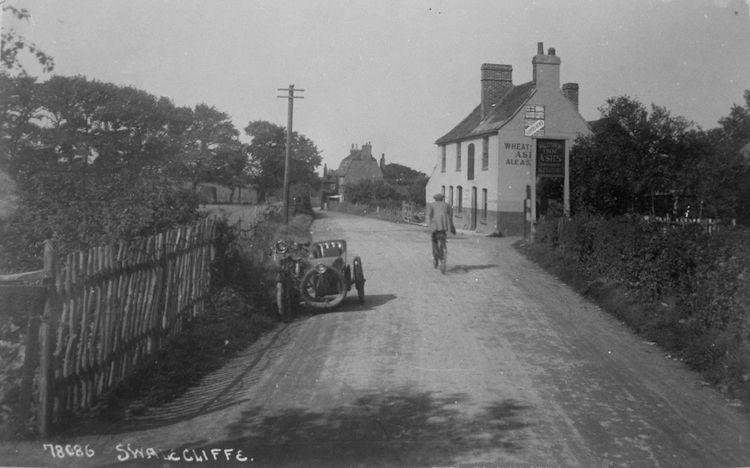
Above postcard, circa 1913, kindly sent by Rory Kehoe. Showing the pub
in the livery of Ash's Dane John Brewery, Canterbury. In the background,
the building with Dutch-style gables traded as a beer house called the "Fan". |
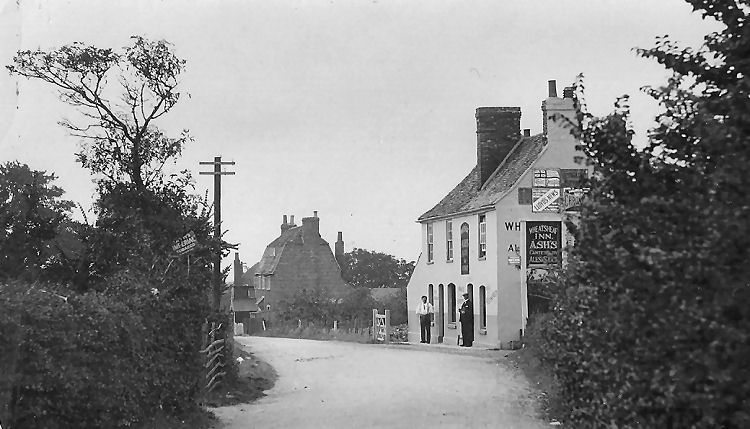
Above photo, circa 1919 by Douglas West, also showing the old Post
Office and the "Fan
Inn," in the background. |
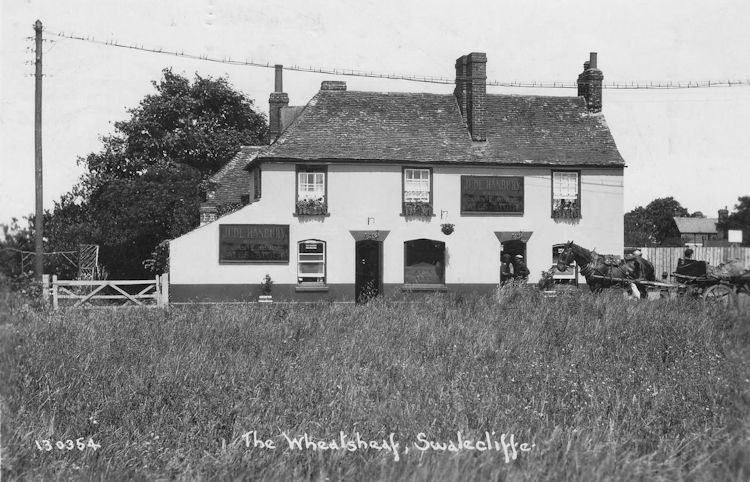
Above postcard, circa 1926, kindly sent by Rory Kehoe. As the etched
windows declare, the Wheatsheaf had been an Ash's Dane John Brewery tied
house, until Jude, Hanbury of Wateringbury acquired their Canterbury
brewery in 1923. This arrangement remained in place until 1929, when
Whitbread's took over JH as part of their somewhat covert acquisition of
Mackeson's Brewery in Hythe. The Dane John Brewery was closed by
Whitbread's in 1933 and the site is now occupied by St. Andrew's United
Reform Church. |

Above postcard, circa 1926, kindly sent by Rory Kehoe. |
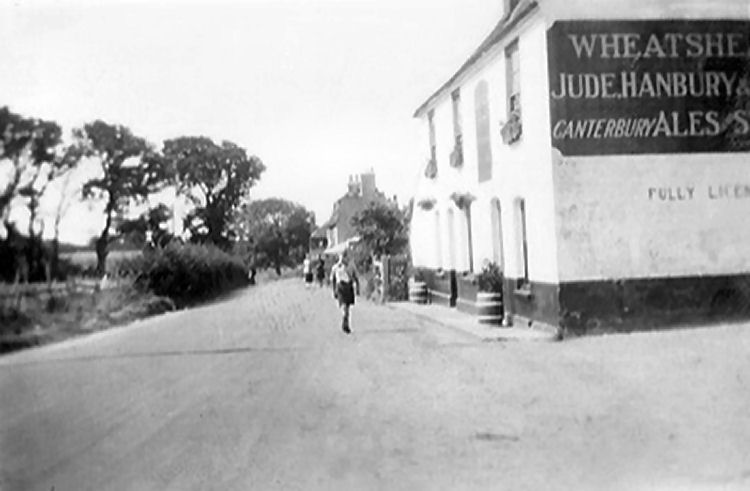
Above photo circa 1924, kindly sent by Garth Wyver. |
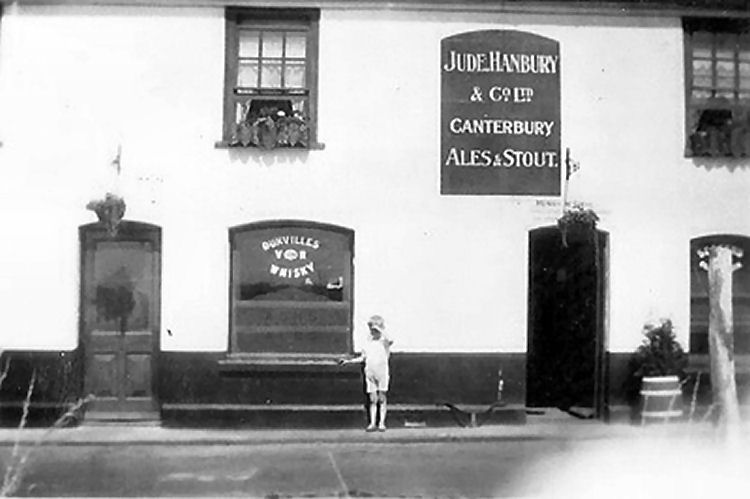
Above photo 1924, kindly sent by Garth Wyver. |

Above postcard, date unknown, kindly sent by Debi Birkin. |
|
From the Whitstable Times and Herne Bay Herald, Saturday 26 October 1935.
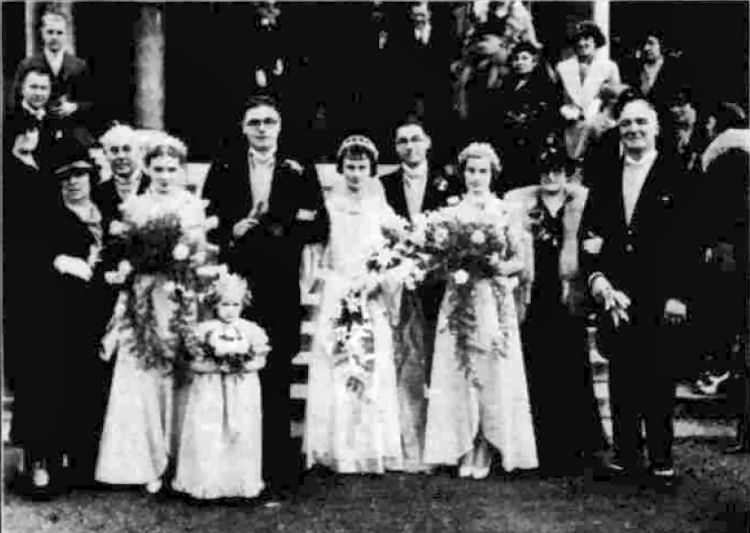
Above photo, showing the wedding of Mr. F. Clements and Miss J. Ball. |
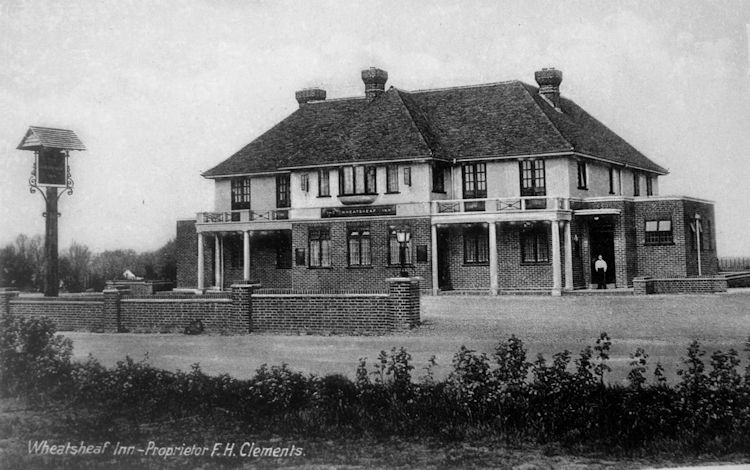
Above postcard, circa 1939, kindly sent by Rory Kehoe. During the 1920s,
the pub had, successively, been a tied house of Ash's, Ash's East Kent
and Jude, Hanbury's, all of which were located at the Dane John Brewery,
Canterbury. In 1929 Whitbread's very quietly acquired Jude Hanbury, then
used the company as a covert vehicle to buy Mackeson's Hythe Brewery
from H&G Simonds' Reading Brewery. Soon after this, all Jude, Hanbury's
East Kent pubs, including the "Wheatsheaf," were rebadged as Mackeson
houses. Around 1934, the old "Wheatsheaf" was demolished and replaced
with the roadhouse-style building that survives to this day. This
photograph was taken in order to be used on business publicity
postcards, which were very popular at the time. It's quite likely that
the gentleman standing in the pub doorway is the licensee, Mr Frank
Clements. |
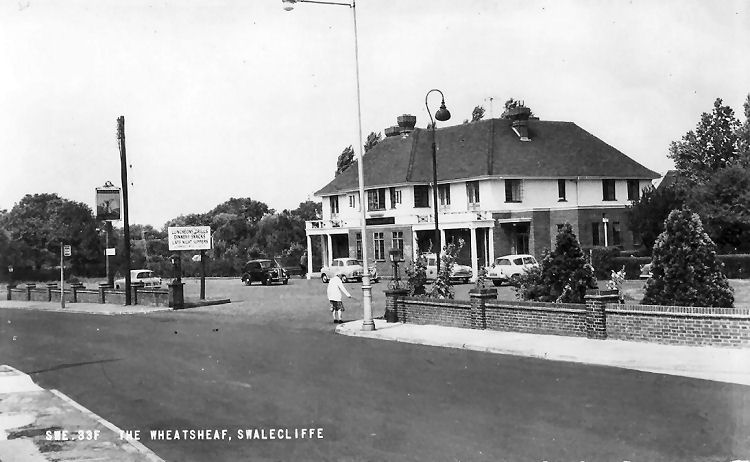
Above postcard, date 1960s |
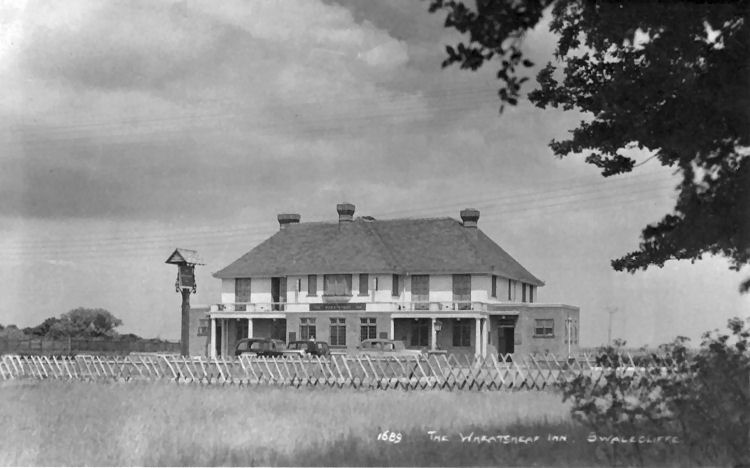
Above postcard, circa 1950. Kindly sent by Rory Kehoe. |
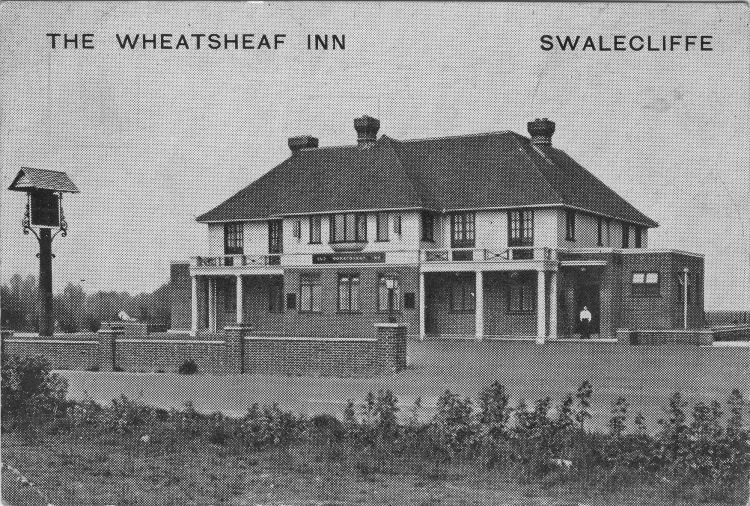
Above photo kindly sent by Peter Moynahan, date unknown. |
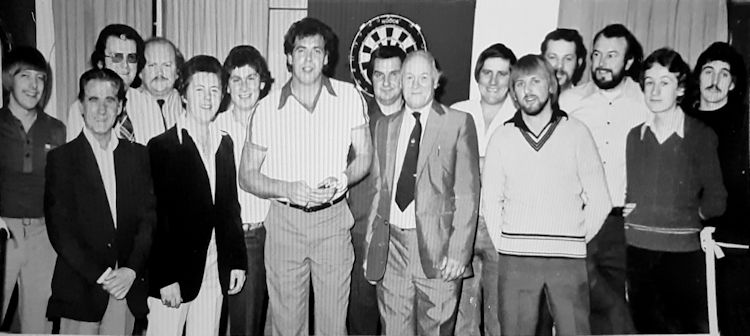
Above photo showing dart player Bobby George, circa 1982, and licensee
Micky Mullins, 4th from left. |

Photos taken on December, 1998 from
http://www.flickr.com
by John Law. |
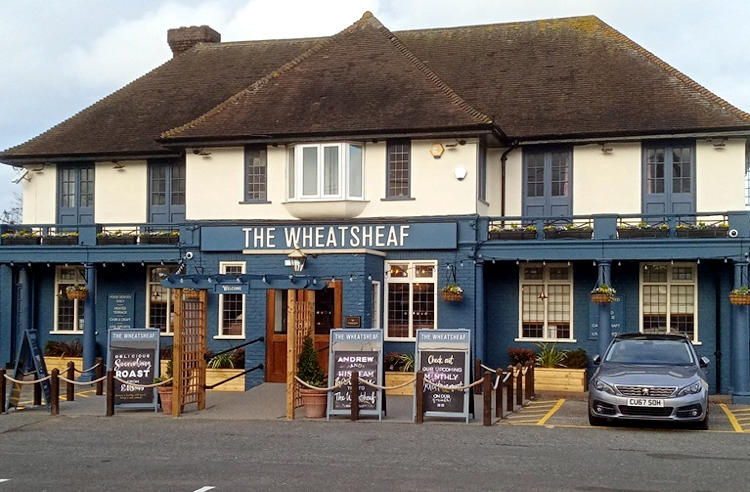
Above photo, 17 February 2024, kindly taken and sent by Rory Kehoe. |
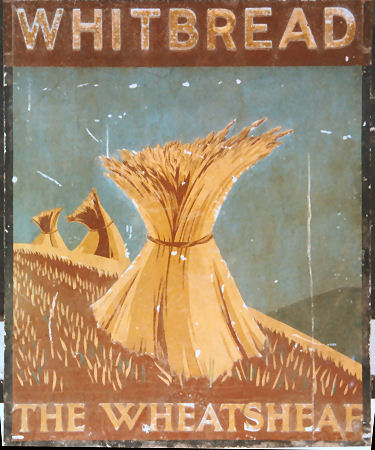
Above sign circa 1950s, kindly sent by Robert Greenham who says:- This
Sign was hanging high up at Whitbread's Beltring Hop Farm (and which, I
was told, was subsequently bought by an American). |
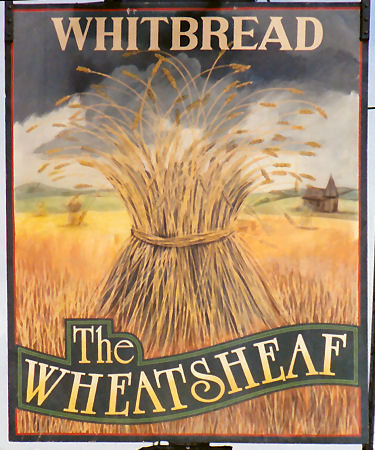 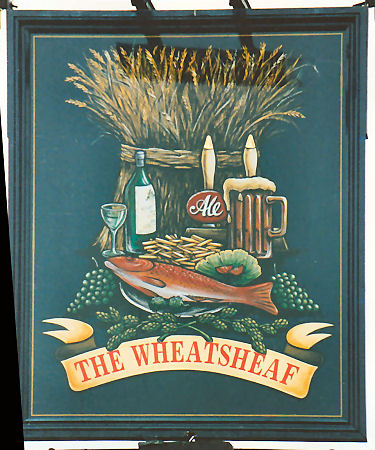
Above sign left, July 1991, sign right, November 1994.
With thanks from Brian Curtis
www.innsignsociety.com. |
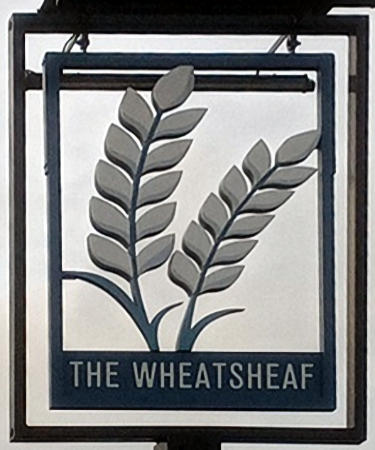
Above sign, 2024, now under Green King. |
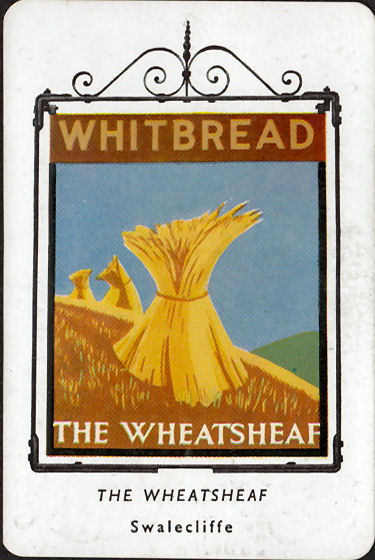 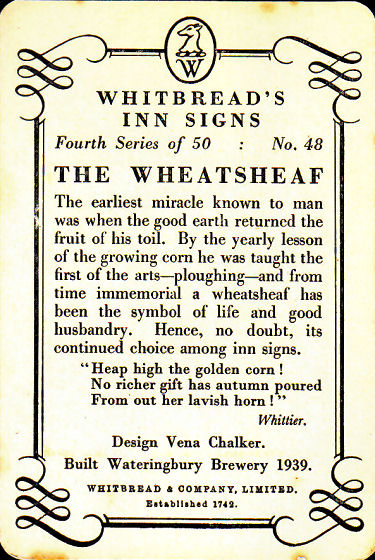
Above card issued March 1953. Sign series 4 number 48. |
|
|
I am informed that the old "Wheatsheaf" was demolished around about
1938 and a new building erected.
|
From the Kentish Gazette, 8 September 1840.
Free Public House, and Rich Arable Land.
To be sold by auction, by Messrs. Whites and Goulden, at the "Falstaff
Inn," St. Dunstan, near Canterbury, on Monday 21st September, 1840, at 2
o'clock in the afternoon.
A most desirable freehold Estate; consisting of a good substantial brick
built public house, called the "Wheatsheaf;" also two messuages, with
large gardens; and a piece of very superior arable land containing 5
acres adjoining, situated at Swalecliffe, and now occupied by Mr.
Stephen Halliday, jun., Mr. John Hudson, and Mr. Stephen Halliday, sen.
Possession maybe had at Michaelmas next; and two-thirds of the purchase
money may remain on mortgage if required.
For further particulars, apply to the auctioneers; or to Messrs, Sankey
and Sladden, solicitors, Canterbury.
|
|
From the Kentish Gazette, 8 September 1857.
SWALECLIFFE. A Child Scalded to Death.
On Saturday week an inquest was held at the "Wheat Sheaf," in this
parish, touching the death of Eleanor Pout, a child, who pulled a
washing shawl containing about half a gallon of hot water over her.
The poor little thing lingered in great agony until Friday night,
when she died.
Verdict:- "Accidental Death."
|
|
From the Kentish Chronicle, 16 July, 1864.
SHORT WEIGHTS AND MEASURES AND FALSE SCALES.
A number of cases of short weights and measures and defective scales were
reported to the Court by Mr. Mount, inspector of weights and measures for
the Home Division. After hearing the circumstances the magistrates convicted
and imposed fines as follows:—
Stephen Haliday, landlord of the “Wheat Sheaf,” Swalecliffe, for two
measures purporting to be pints, fined 5s. and 11s. costs.
|
|
From the Whitstable Times, 15 September, 1900.
SWALECLIFFE. REFUSED TO QUIT.
Mark Sinclair was summoned for refusing to quit the "Wheatsheaf"
public-house on the 20th ult.
Defendant pleaded guilty.
Mr. R. M. Mercer, who prosecuted, said the defendant was supplied with a
pint of beer by the landlord, but subsequently owing to a number of others
treating him he got so intoxicated that the landlord refused to serve him.
He then wanted to fight the landlord and great disorder ensued.
Superintendent Jacobs said that the house was conducted remarkably well, but
the landlord was subject to a great deal of annoyance from people such as
defendant.
The bench imposed a fine of 10s. and costs £1 5s, 3d. or 14 days'.
|
|
Whitstable Times and Herne Bay Herald, Saturday 14 March 1936.
PLANS FOR ALTERATIONS APPROVED.
Plans were presented for alterations at the "Wheatsheaf." Swalecliffe.
It was explained that the proposal was to take out the wall dividing the
present private bar and saloon bar, and to make a doorway from the
present lounge to give access to the Club room.
Superintendent Wheatley said that the alterations would be an
improvement.
The plans were approved.
|
|
Whitstable Times and Herne Bay Herald, Saturday 15 February 1936.
WINE LICENCE FOR "THE PLOUGH," SWALECLIFFE.
Mr. A. K. Mowll applied for a wine on-licence in respect of the
"Plough," Swalecliffe.
Mr. Elliot B. Allard opposed on behalf of the licensee of the "Wheatsheaf,"
Swalecliffe.
Mr. Mowll said that Mr. E. G. Harvey had been licensee of the "Plough"
for ten years and his father was licensee for ten years previously. A
large number of houses for working class people had been erected in the
district and there were camps in the summer. Many people came for their
holidays and if people went to the "Plough" they could not obtain wine,
but beer only. The "Wheatsheaf" was about half a mile away.
The licensee said the demand for wine had become greater each year.
About a thousand people camped in the district in the summer. Many
people asked for port wine, etc., but were unable to obtain it.
In reply to Mr. Allard, witness said there was an estate extending from
the railway arch to his premises, and the houses were of good class. On
the other side of the road there were summer bungalows and about half of
these were now occupied. Witness did not agree that all the development
was nearer to the "Wheatsheaf."
Mr. Harold Campbell Ashenden, architect, produced a plan showing the
building development in the district especially during the past four
years. There were an additional 115 buildings within half a mile as
compared with 72 four years ago. Another 300 to 400 plots had already
been laid out for future development. The area was growing as rapidly as
any part of the country.
In reply to Mr. Allard, witness asserted that the greater development
was nearer the "Plough" than the "Wheatsheaf."
Mr. Allard said the new "Wheatsheaf" was finished on May 8th last year,
and the building cost £6,500 and the furnishing £1.500. The old "Wheatsheaf"
had been there for many years and had a full licence and because of this
and the fact that the neighbourhood was growing it was decided to cater
for the people who were in the district then and also for the growing
neighbourhood. It seemed most unfair that a house which had taken
advantage of the position and catered at the very start for the few who
were there should, when the district had developed, lose a proportion of
its trade through a second house coming forward for a wine licence. The
"Wheatsheaf" could cater for the whole of the trade of the area. The
distance between the two houses was 850 yards and that was not a very
great distance. New houses were being occupied by retired people who
preferred to walk to the "Wheatsheaf" where they could get served in
comfort and where everything had been done to make them comfortable,
instead of going to a house which was quite a good house in its way but
one which, he thought, should be kept for the farm labourer and the
farming type who wanted a glass of beer on the spot. The "Plough" had
been large enough to cater for that trade during the many years Mr.
Harvey and his father had been there and what was desired to be done now
was to sell wine to the persons who went into the house. He (Mr. Allard)
submitted that one of the main objects of the licensing restrictions was
to see that persons who had laid out money in preparation for the public
should not lose by indiscriminate granting of further licences to houses
which were not required to cater for the new trade. The "Wheatsheaf "
had not had the chance to reap the benefit of its enterprise and he
submitted it was quite wrong that a licence for wine should be granted
to the "Plough." What was to prevent an application being made next year
for a spirit licence, and then for the transfer of the licence to the
Coastal Road which was near by? He submitted that for the present no
further facilities were required.
The application was granted.
MUSIC AND DANCING LICENCES.
An application for a music and dancing licence was granted to Mr.
Clements in respect of the "Wheatsheaf Hotel," Swalecliffe.
|
LICENSEE LIST
LANKEY Robert 1837+
HALIDAY/HOLLIDAY Stephen 1851-81+ (also farmer age 73 deaf in 1881 ) )
BURCHETT James Burchett 1891+ (also brickmaker age 49 in 1891 ) )
DOVEY Joseph 1901+ (age 52 in 1901 ) )
DELVEY Joseph 1903+

ROWE John 1911-Jan/14 (age 44 in 1911 ) )

FAGG Alfred George Jan/1914-22+

COOKE John 1924+

DRYE Henry W 1930+
CLEMENTS Frank Howard 1935-39+ (age 27 in 1939)
https://pubwiki.co.uk/Wheatsheaf.shtml
 Whitstable Times
and Herne Bay Herald Whitstable Times
and Herne Bay Herald
 Census Census
 From the Kelly's Directory 1903 From the Kelly's Directory 1903
 From the Kelly's Directory 1924 From the Kelly's Directory 1924
|





















